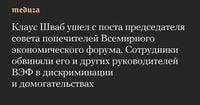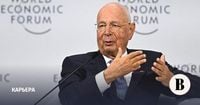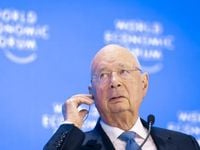Klaus Schwab, the founder of the World Economic Forum (WEF) in Davos, has officially stepped down from his position as Chairman of the Board of Trustees. This announcement was made during an extraordinary meeting of the board on April 20, 2025, where Schwab cited his upcoming 88th birthday as a significant factor in his decision.
In his resignation statement, Schwab remarked, "After my recent announcement and as I enter my 88th year of life, I have decided to step down as Chairman and member of the Board of Trustees with immediate effect." His resignation was accepted unanimously by the board, which subsequently appointed Peter Brabeck-Letmathe, the vice chairman, as interim chairman.
Schwab has been a pivotal figure in global economic discussions since he founded the WEF in 1971. Over the past five decades, he has held various leadership roles, including that of executive chairman and chairman of the board, shaping the forum into a prominent platform for dialogue among political and business leaders.
His departure marks the end of an era for the WEF, which has been a focal point for discussions around international economic policies and challenges. However, Schwab's tenure has not been without controversy. In recent years, he faced increasing scrutiny and criticism regarding the organization's internal culture.
In 2024, former and current WEF employees accused Schwab and other leaders of fostering an environment that was allegedly discriminatory against women and people of color. The Wall Street Journal reported that complaints filed within the organization highlighted a hostile atmosphere under Schwab's leadership. These allegations included claims of harassment and discrimination, which both Schwab and the WEF have denied.
The criticisms have intensified over time, leading to calls for greater accountability within the organization. As Schwab exits, a search committee has been formed to find a permanent successor, indicating a shift in leadership that may address these concerns.
Schwab's legacy is complex; while he is credited with bringing global attention to pressing economic issues, the recent allegations have cast a shadow over his accomplishments. His decision to resign comes at a time when the WEF is under pressure to reform and adapt to changing societal expectations.
Peter Brabeck-Letmathe, who will serve as the interim chairman, previously held the position of chairman of the board at Nestlé and has been a member of the WEF board for many years. His appointment signals continuity in leadership, but it also raises questions about how the new leadership will tackle the issues raised during Schwab's tenure.
As the WEF prepares for its future, the organization faces the challenge of redefining its mission and addressing the criticisms that have emerged. The upcoming meetings and discussions will be closely watched by stakeholders who are eager to see how the forum plans to navigate its path forward.
Schwab's resignation is not just a personal milestone; it represents a pivotal moment for the WEF as it seeks to rebuild trust and credibility in a rapidly changing global landscape. The forum's ability to adapt to these challenges will be crucial in maintaining its influence and relevance in international economic discussions.
In conclusion, Klaus Schwab's departure from the World Economic Forum marks a significant transition for the organization. As the WEF looks to the future under new leadership, it must confront the challenges of accountability and inclusivity, ensuring that it remains a vital player in global economic dialogue.






